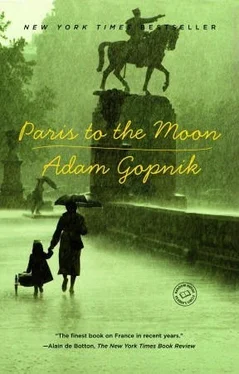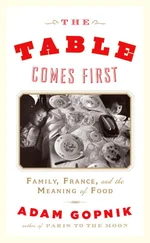Angels Dining at the Ritz
When Martha was still pregnant, we decided to join the pool at the Ritz hotel on the Place Vendome for eight weeks. We had, as I’ve said, thought about it once before, during our adventures at the Regiment Rouge, but had gotten scared off by the expense and by all those tea sandwiches on silver platters. For four years we had been swimming at the public pool of the Sixth Arrondissement near the old Saint-Germain market, a nice place, with families splashing in one part and solitary fierce-looking swimmers doing laps in the other—though, like every French public institution, terribly overcharged with functionaires, in this case officious, functionary lifeguards. But then the same friend who had invited us there that first time invited us to the Ritz pool again, to spend a Sunday away from the August heat. With Martha pregnant and more or less immobile, we weren’t able to go away anyway, even though everyone in Paris goes away in August. (The five-week mandatory vacation is part of the inheritance of the old Popular Front of the thirties, one of the laws put over by the saintly Socialist leader Leon Blum.) Anyway, we couldn’t go anywhere, not with Martha that big, and we were cool and comfortable there at the pool. Paris is hot in August—really, suddenly hot—and not many places are air-conditioned. Even the ones that claim to be climatise are not really air-conditioned as public places are in New York. Instead a trickle of chilly air floats someplace around the baseboards.
The pool at the Ritz hotel in Paris—they actually call the place the Ritz Health Club, in English, although I think this is designed less as a concession to Americans than as a lingering sign of old-fashioned Parisian Anglomania, like calling the Jockey Club in Paris the Jockey Club—is intended to look “Pompeian” in a way that I suppose makes a strong case for Mount Vesuvius and molten lava. There is a high domed skylight, held up by painted Ionic columns with rosettes along their pillars and bordered by a bas-relief frieze of classical figures standing around in a line, as though waiting to check out of the hotel. There is a trompe 1’oeil ceiling painting of old Roman bathers looking down at contemporary French swimmers, with more colored architectural drawings of Roman temple fronts decorating the locker rooms and the showers, and, on either side of the pool, two enormous murals of Romans in togas standing around on terraces, all painted in a style someplace between Victorian-Academic and New York Pizzeria.
My favorite detail at the Ritz pool is a pair of mosaics on the bottom of the pool, right where the shallow end starts to incline and deepen a little, of two comely and topless mermaids, with long blond hair—tresses, really—floating off to one side. With one hand they reach down modestly; with the other each holds up one half of the great seal of the Ritz. (Where most mermaids have fishtails that begin at their waists, these mermaids have fishtails that begin only at their shins.) These are real mosaics, by the way, assembled shiny shard by shiny shard, and they probably would be a treasure if they had actually been made by a Roman artisan and dug up by an archaeologist. The line between art and kitsch is largely measured in ruin.
Martha felt cool there, and cool matters a lot to a nine-month pregnant woman. We sat by the edge of the pool in white terry-cloth robes, surrounded by thin rich women with very high hair, who were listlessly turning the pages of magazines and occasionally going into the pool to swim. They swam like nervous poodles, with their heads held high, high, high— up out of the water on their long necks, protecting their perfect helmets of hair from the least drop of moisture.
We ate lunch up on the curved terrace overlooking the pool and thought, only with a little guilt. Well, this is nice. So we inquired and found that we could get an eight-week nonpeak hours, never-on-Sunday family membership for a lot less than it cost us to rent a cottage in Cape Cod every summer for two weeks—and in Cape Cod, we work all day and night, sweeping the sand out of the house and bringing up the laundry and stoking up the grill and then cleaning up the kitchen. So with a slightly nervous sense of extravagance, we decided to subscribe to the Ritz pool for the minimum off-hours “family” membership, a little joke, we assured ourselves, laid at the altar of the old Hemingway-Flanner Paris. I felt a little guilty about it, I guess—I felt a lot guilty about it, really—but I also thought that Leon Blum, all things considered, wouldn’t get too mad at me. I gave it a vaguely Socialist feeling; it was our five weeks.
Since our experience at the Regiment Rouge I had been improvising exercise. For a while we had gone running with the rest of the Americans, and the French riot police, around the Luxembourg Gardens. The gardens are filled with busts and statues of writers, which make it easy to mark your progress as a runner. A half lap of the gardens, for instance, takes you right to a bust of Sainte-Beuve, the good literary critic whom Proust attacked; the two-thirds point is marked by another bust, this one of Baudelaire; and then finally, completing the circuit, you go past the Delacroix monument, with angels looking up admiringly at his haughty, mustachioed head. At the start I could do a Baudelaire and then, after a couple of months’ practice, two full Delacroix’s, not bad. The trouble was that the great men seemed to look out disdainfully from their pedestals at the absurdity of Americans running today in order to run more tomorrow. Get drunk instead, Baudelaire seemed to counsel, intelligently, with his scowl. Eventually we bought a stationary bike, and I tried to do twenty-four minutes a day on it, re-creating the conditions of the New York Health and Racquet Club on Thirteenth Street, more or less in the dubious, perverse spirit of a British lieutenant wearing flannel and drinking tea at five o’clock in the Sahara. I had even bought a pair of dumbbells.
After a couple of weeks, though, Martha was too big to do much of anything, and then Olivia Esme Claire, our beautiful little girl, was born. But we still had six weeks to work out on the membership, so Luke Auden and I kept going. I was nervous and interested. I associated the Ritz with a kind of high life that makes me uneasy, and this is not because I do not like expensive and “exclusive” pleasures, but because I do, and always feel unskilled in their enjoyment. I knew that the Ritz in Paris had once been dashing and elegant but also knew that now there was, as with so many old places of luxury, a note of unhappy rootlessness to the place. It was the capital of the non-Paris Paris. It had what we would have called at my high school bad karma. While we were living in Paris, it had been the place where Pamela Harriman had passed out—“I go badly,” she had said, and went—and where Princess Diana too had left on that last car trip. English politicians in particular seemed to come to grief there; one prominent MP, I had vaguely heard, had spent a night, had it paid for by the wrong person, and lost his reputation. There was about it now, for all that it was still frequented by high-living Parisians, a note less of old Parisian high life than of new, late-century overclass big money, with big money’s unhappiness about it, that high-strung video surveillance watchfulness of the very, very rich. I liked arriving at the Ritz and having a little commis in uniform spin the revolving door for me, but I was always worried about the way I looked when he did. I am hedonistic but not at all heedless, a bad combination. I watch the meter in the limousine, the revolving door as it spins.
Luke of course took it for granted, as children take all things. He learned to swim there, first backstroke, then “frontstroke.” I felt a vague feeling of paternal pride about him, though I hadn’t really taught him. Just dropped him in, really.
Читать дальше












